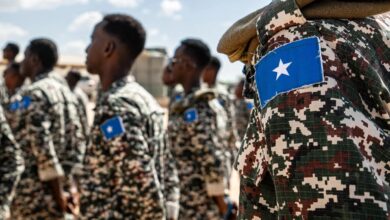Tigrayan rebels announced Monday they have withdrawn from two regions in northern Ethiopia and retreated to their Tigray stronghold, a new turning point in the brutal 13-month war.
If confirmed, the pullout from Amhara and Afar could spur hopes for possible dialogue to silence the guns in a conflict that has killed thousands of people and created a severe humanitarian crisis with many on the brink of famine.
“We have just completed the withdrawal of our forces from both #Amhara&#Afar regions,” TPLF spokesman Getachew Reda said on Twitter.
The battlefield has been shifting since late October, with both sides declaring major territorial advances, and the rebels at one point claiming to be only 200 kilometers (125 miles) by road from the capital Addis Ababa.
But since Prime Minister Abiy Ahmed — the 2019 Nobel Peace Prize winner — headed to the front last month, according to state media, the government has claimed to have retaken a string of key towns.
US State Department spokesman Ned Price said that if the TPLF retreat was confirmed, “that is something we would welcome.”
“It’s something we’d call for, and we hope it opens the door to broader diplomacy.”
But Abiy’s spokeswoman Billene Seyoum dismissed Monday’s rebel announcement as a cover-up for military setbacks.
“The TPLF have sustained great losses over the past weeks and hence are claiming ‘strategic retreat’ to make up for defeat,” she told AFP.
“There are still pockets in the Amhara region in which they remain as well as other fronts they are attempting to open the conflict.”
The fighting in Africa’s second most populous nation has displaced over two million people while more than nine million are in need of food aid, according to UN estimates.
There have been reports of massacres, mass rapes, and other atrocities by all sides, and the UN Human Rights Council last week ordered a probe into a wide range of alleged abuses, a move condemned by Addis Ababa.
Communications have been cut in the conflict zone and access for journalists is restricted, making it difficult to verify battlefield claims.
‘Space for Dialogue’
In the face of the escalating fighting and fears of a rebel march on the capital, alarmed foreign governments last month urged their citizens to leave Ethiopia as soon as possible.
Despite a flurry of diplomatic efforts led by the African Union to broker a ceasefire, there have been no visible signs of a breakthrough.
The UN Security Council held a closed-door meeting on Ethiopia on Monday, but nothing concrete emerged.
Ireland’s UN envoy Geraldine Byrne Nason, who called the meeting, told reporters the TPLF pullout offered “a welcome opportunity to hopefully create political space for dialogue.”
The rebels had previously dismissed the government’s insistence on their withdrawal from Afar and Amhara for talks to begin as “an absolute non-starter.”
But in a letter to UN Secretary-General Antonio Guterres dated Sunday, TPLF leader Debretsion Gebremichael called for an immediate cessation of hostilities and said he hoped the rebel withdrawal would be “a decisive opening for peace”.
Debretsion also called for the establishment of a no-fly zone over Tigray and an air or land aid corridor, as well as arms embargoes on Ethiopia and neighboring Eritrea.
He also asked the Security Council to ensure the withdrawal of Amhara forces and Eritrean troops from western Tigray.
Both Amharas and Tigrayans lay claim to western Tigray, which has been occupied by Amhara forces since the war erupted, triggering large-scale displacement and US warnings of ethnic cleansing.
Amnesty and Human Rights Watch last week accused Amhara forces of systematically detaining, torturing and starving Tigrayan civilians living in the contested region.
Humanitarian ‘Siege’
Previously, TPLF leaders had refused to pull out of Amhara and Afar unless the government ended what the rebels describe as a humanitarian “siege” of Tigray.
Aid workers have repeatedly complained that security and bureaucratic hurdles are impeding access to the stricken region, where some 400,000 people are thought to be on the verge of famine.
The UN also suspended humanitarian flights from Addis Ababa to Tigray’s capital Mekele in October amid a campaign of government air strikes in the region. The flights resumed in November.
Meanwhile, Guterres’ deputy spokesperson Farhan Haq told a briefing in New York that 11 UN staff members and two dependants remained in detention, and called for them to be released.
The war broke out in November 2020 when Abiy sent troops into Tigray to topple the TPLF, the region’s ruling party which had dominated national politics for three decades until he took power in 2018.
He accused its fighters of attacking army camps and vowed a swift victory. But the TPLF mounted a shock comeback, recapturing most of Tigray by June before advancing into Afar and Amhara.












